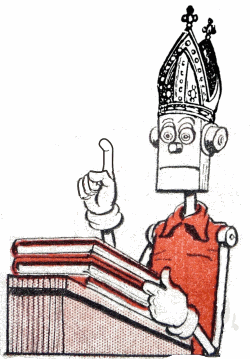 This piece (via MLU)notes how a robot is giving lectures in theology – or perhaps it would be more accurate to say that it’s being used as a prop for some theology lectures. It helps dramatise certain human issues, either the ‘strong’ ones about it lacking the immortal soul human beings are taken to have in Christian thought, or some ‘weak’ ones about more general ethical issues.
This piece (via MLU)notes how a robot is giving lectures in theology – or perhaps it would be more accurate to say that it’s being used as a prop for some theology lectures. It helps dramatise certain human issues, either the ‘strong’ ones about it lacking the immortal soul human beings are taken to have in Christian thought, or some ‘weak’ ones about more general ethical issues.
Nothing wrong with that; in fact I’ve heard it argued that all thinking robots would be theists, because to them it would seem obvious, almost self-evident, that conscious entities need a creator. No doubt D.A.V.I.D helps to raise interest, but he doesn’t seem half as provocative as the Jesus automaton described here; not a modern robot but a feature of the medieval church robot scene, apparently a far livelier business than we could ever have guessed.
It’s certainly true that those old automata had a deep impact on Western thought about the mind. Descartes describes hydraulic ones, and it’s clear that they helped form his idea of the human body as a mere machine. The study of anatomy was backing this up – Leonardo da Vinci, for example, had already concluded on the basis of anatomy alone that the brain was the centre from which the body was controlled. Together these two influences banished older ideas of volition acting throughout the body, with your arm moving because you just wanted it to, impelled by your unintermediated volition. These days, of course, some actually think we have gone too far with our brain-centrism, and need to bring in ideas of embodiment and mind extension; but rightly or wrongly the automata undoubtedly changed our minds dramatically.
The same kind of thing happened when effective computers came on the scene. Before then it had seemed obvious that though the body might be a machine, the mind categorically was not; now there was a persuasive case for thinking our minds as well as our bodies might be machines, and I think our idea of consciousness has been reshaped gradually since so that it can fill the role of ‘the thing machines can’t do’ for those who think there is such a thing.
It might be that this has distorted our way of looking at consciousness, which never occupied an important place in ancient thought, and does not really feature in the same way in non-western traditions (at least so far as I can tell). So perhaps robots shouldn’t be teaching us about the mind. On the other hand, they sometimes come up with interesting stuff. Dennett’s discussion of the frame problem is a nice example. Most people take the frame problem – in essence, dealing with all the small background details of real-world situations which multiply indefinitely, are probably irrelevant, but might just come back to bite you – as a problem for AI: but Dennett thoughtfully suggested that it was in fact a problem for all forms of intelligence. It was just that the human brain dealt with it so smoothly we’d never noticed it before: but to explain how the brain dealt with it was at least as problematic as building a robot that could handle it. In this way the robots had given us a new insight into human cognition. So perhaps we should listen to them?
